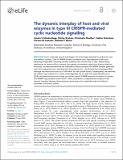Files in this item
The dynamic interplay of host and viral enzymes in type III CRISPR-mediated cyclic nucleotide signalling
Item metadata
| dc.contributor.author | Athukoralage, Januka Sahan | |
| dc.contributor.author | Graham, Shirley | |
| dc.contributor.author | Rouillon, Christophe | |
| dc.contributor.author | Gruschow, Sabine | |
| dc.contributor.author | M Czekster, Clarissa | |
| dc.contributor.author | White, Malcolm | |
| dc.date.accessioned | 2020-05-14T15:30:05Z | |
| dc.date.available | 2020-05-14T15:30:05Z | |
| dc.date.issued | 2020-04-27 | |
| dc.identifier | 267649562 | |
| dc.identifier | cb7ae7bf-ae06-4846-bfa5-2ea93d6e6a8a | |
| dc.identifier | 85084260890 | |
| dc.identifier | 32338598 | |
| dc.identifier | 000531890200001 | |
| dc.identifier.citation | Athukoralage , J S , Graham , S , Rouillon , C , Gruschow , S , M Czekster , C & White , M 2020 , ' The dynamic interplay of host and viral enzymes in type III CRISPR-mediated cyclic nucleotide signalling ' , eLife , vol. 9 , e55852 . https://doi.org/10.7554/eLife.55852 | en |
| dc.identifier.issn | 2050-084X | |
| dc.identifier.other | ORCID: /0000-0003-1543-9342/work/74117688 | |
| dc.identifier.other | ORCID: /0000-0002-7163-4057/work/74117963 | |
| dc.identifier.other | ORCID: /0000-0002-1666-0180/work/74118125 | |
| dc.identifier.uri | https://hdl.handle.net/10023/19945 | |
| dc.description | This work was supported by a grant from the Biotechnology and Biological Sciences Research Council (Grant REF BB/S000313/1 to MFW) and the Wellcome Trust (Grant 210486/Z/18/Z to CMC). | en |
| dc.description.abstract | Cyclic nucleotide second messengers are increasingly implicated in prokaryotic anti-viral defence systems. Type III CRISPR systems synthesise cyclic oligoadenylate (cOA) upon detecting foreign RNA, activating ancillary nucleases that can be toxic to cells, necessitating mechanisms to remove cOA in systems that operate via immunity rather than abortive infection. Previously, we demonstrated that the Sulfolobus solfataricus type III-D CRISPR complex generates cyclic tetra-adenylate (cA4), activating the ribonuclease Csx1, and showed that subsequent RNA cleavage and dissociation acts as an ‘off-switch’ for the cyclase activity. Subsequently, we identified the cellular ring nuclease Crn1, which slowly degrades cA4 to reset the system (Rouillon et al., 2018), and demonstrated that viruses can subvert type III CRISPR immunity by means of a potent anti-CRISPR ring nuclease variant AcrIII-1. Here, we present a comprehensive analysis of the dynamic interplay between these enzymes, governing cyclic nucleotide levels and infection outcomes in virus-host conflict. | |
| dc.format.extent | 16 | |
| dc.format.extent | 4184454 | |
| dc.language.iso | eng | |
| dc.relation.ispartof | eLife | en |
| dc.subject | QH301 Biology | en |
| dc.subject | Neuroscience(all) | en |
| dc.subject | Immunology and Microbiology(all) | en |
| dc.subject | Biochemistry, Genetics and Molecular Biology(all) | en |
| dc.subject | DAS | en |
| dc.subject | BDC | en |
| dc.subject | R2C | en |
| dc.subject.lcc | QH301 | en |
| dc.title | The dynamic interplay of host and viral enzymes in type III CRISPR-mediated cyclic nucleotide signalling | en |
| dc.type | Journal article | en |
| dc.contributor.sponsor | BBSRC | en |
| dc.contributor.sponsor | BBSRC | en |
| dc.contributor.institution | University of St Andrews. School of Biology | en |
| dc.contributor.institution | University of St Andrews. Biomedical Sciences Research Complex | en |
| dc.identifier.doi | 10.7554/eLife.55852 | |
| dc.description.status | Peer reviewed | en |
| dc.identifier.grantnumber | BB/S000313/1 | en |
| dc.identifier.grantnumber | BB/T004789/1 | en |
This item appears in the following Collection(s)
Items in the St Andrews Research Repository are protected by copyright, with all rights reserved, unless otherwise indicated.

